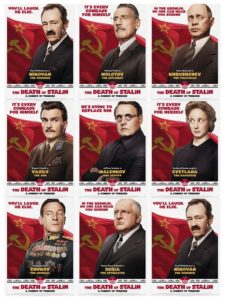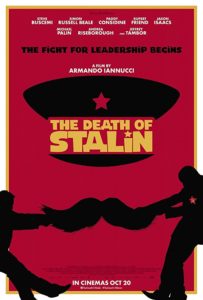 (4 / 5)
(4 / 5)
Armando Iannucci’s The Death of Stalin pokes irreverent fun at the likely sense of paranoia and ambition surrounding the demise of the tyrant and is hysterically funny.
Production Details

Directed by Armando Iannucci
Written by Armando Iannucci et al
Jason Isaacs as Georgy Zhukov; Andrea Riseborough as Svetlana Stalin; Olga Kurylenko as Maria Yudina; Steve Buscemi as Nikita Khrushchev; Rupert Friend as Vasily Stalin; Jeffrey Tambor as Georgy Malenkov; Paddy Considine as Comrade Andryev; Richard Brake as Tarasov; Michael Palin as Vyacheslav Molotov; Simon Russell Beale as Lavrentiy Beria; Paul Whitehouse as Anastas Mikoyan; Jonathan Aris as Mezhnikov; Dermot Crowley as Kaganovich
Country: France and the UK
Time: 106 minutes
Cert: 15 for strong language throughout and infrequent scenes of strong violence
Story of The Death of Stalin
The film is based upon the French Graphic novel La mort de Staline, which depicts the final days of Stalin and the upheaval occasioned by the death of Josef Stalin in 1953, amongst leading members of the Central Committee of the Communist Party of the Soviet Union.
The film shouldn’t be taken as a statement of historical fact, although in many ways it is surprisingly accurate.
Stalin’s court of the Red Tsar was so grotesquely idiosyncratic that it contained within its morose heart a strong vein of absurdity. If you want real history, go to a history book not a film, especially not a comedy. But surprisingly, the details are excellent: the khaki facade and wood panelling of Stalin’s mansion, the line of phones, the Packard limousines, the white summer suit of Malenkov. Yes, there are mistakes: the NKVD secret police was then the MGB; most of the titles are wrong. Molotov,
Mikoyan and Beria had all been sacked as ministers of foreign, trade and internal affairs four — or, in Beria’s case, eight — years earlier, and so on, but none of that matters.
Extracted from an article by Simon Sebag Montefiore featured in the Culture Magazine of the Sunday Times ( September 24 2017).
The film start with a supremely funny episode where the Russian pianist Maria Yudina is playing the achingly beautiful 2nd movement of Mozart’s Piano Concerto No. 23 which is being played on Russian State Radio. A phone call from Stalin to the director says he wants a recording of the concert just as it has finished. Of course, the concert has not been recorded, and as the orchestra and audience disperse, the direct frantically recalls them so that they can do part of the concert again, this time recording it. By now, the conductor has had an accident involving a blow to the head, the pianist will only play for a large sum of money and a team is sent out to the streets of Moscow to shanghai anybody they can find to fill the gaps in the audience and create a sufficient level of applause. Of course, the people that are brought in are the last you would expect at a classical concert, the dregs and low class of Moscow society. An eminent conductor is himself kidnapped from his bed to conduct and he turns up attired in dressing gown and pyjamas.
The pianist, has managed to sneak in a defamatory note within the record sleeve of the now recorded performance, which, when read by Stalin causes a cerebral hemorrhage subsequentally leading to his death.
Ludicrous as this seems, it does have an element of truth. Maria Yudina was playing this very Mozart piece in 1944, (not 1953 as in the film), at a concert live on Soviet, radio when Stalin so taken by the performance, asked for a recording. However, as it was a live recording, it didn’t exist. So Maria was dragged out of her bed in the middle of the night and a makeshift small orchestra was assembled and the recording was made during the small hours with the one pressed copy going to Stalin.
It just goes to show that even the most coarsest of Georgian dictators can have the most supreme taste in music.
Maria’s sending of the note is totally fictitious and potentially libelous excepting the fact that she has been dead for forty seven years. This storyline does feature in the graphic novel and has been transferred to the film.
The director has cleverly adapted this truthful event into the plot of the story recognising its comedic potential. This is a prime example of Armando Ianucci’s supreme eye for comic material based on elements of fact.
The Script
The script maintains a high level of wit throughout; or at least, until the harder edged final twenty minutes. An abundance of highly amusing lines pervade throughout. I particularly liked the line uttered by Steve Buscemi’s Nikita Khrushchev when given the dubious honour of managing the state funeral of Stalin.
Whilst his assistant is making Stalin as beautiful that a dead dictator can be, he complains, insisting he hurries things alone, that He isn’t Clark Gable.
Incidentally, Gable was one of Stalin’s favourite actors.
There is anoter scene which comes straight out of Monty Python, and I don’t write that just because Michael Palin appears in it. Beria has kept his wife secretly in prison and Palin’s character Molotov, trying to ingratiate himself with the all-powerful spymaster and head of security, when his wife’s name comes up refers to her as a treacherous spy and other extremely abusive terms, not knowing that Beria has released his spouse who is standing just behind the door but not in Molotov’s view. Beria and Khrushchev knowing about the presence are increasingly getting more and more uncomfortable so Beria, to save further embarrassment announces her presence, so that when she walks in Molotov greets her with effusive affection in the total opposite manner that he had second before showed.
The Cast
If ever a more talented comedic ensemble class has been out together for a film in recent years, I would like to know about it. The talent on display is breathtaking. Mostly British, there are a couple of notable exceptions including the brilliant Steve Buscemi, Is there a better character actor in film today? Simon Russell Beale might be the one more likely to win awards for his portrayal of the brilliant, ruthless and ultimately dead Beria. He carries the right balance of playing an evil man but in a comedic way.
Andrea Riseborough is brilliant as Stalin’s daughter Svetlana, becoming more and more paranoid due to Steve Buscemi’s Krushchev insistence that he will protect her in the aftermath of her father’s demise, when she had been previously unaware that she needed to be protected in the first place.
Rupert Friend as Svetlana’s crazed brother Vasily, is extremely funny, especially when it comes to composing and delivering his late father’s eulogy.
For me, the pick is Jason Isaacs, who doesn’t appear until half way through the film. However the wait is worth it. His portrayal steps right out of the graphic novel. He is totally OTT playing General Georgy Zhukov with a broad northern accent and no-nonsense approach to all things militaristic. This is actually very close to the characteristics of the real life General – excepting he wasn’t a Lancastrian.
I could go on because there are other brilliant caricatures in this film.
Summary
This is the funniest film that I have seen in years. Admittedly, it won’t be to everyone’s taste, but unlike so many other films of this genre, although it is totally OTT, Ianucci manages to keep matters from getting out of control. The cast seem to have been enjoying making the movies as well as filmgoers receive it, which is usually a good sign. I recommend this unreservedly to those of you who like Ianucci’s work, (Veep), Monty Python fans and the films of Wes Anderson.
Critical Response
It has been received overwhelmingly positively and has a score of 7.7 on IMDB and a 96% approval rating among critics on Rotten Tomatoes.
Trivia
A principal location used for The Death of Stalin is “Blythe House, 23 Blythe Road, West Kensington, London. This property which nowadays stores artificats from the Victoria and Albert Museum and the British Museum, was used as “The Circus” in the 2011 adaptation of John Le Carre’s Tinker Tailor, Soldier Spy.
The film may well be banned in Russia, although it has a distributor in that country. n September 2017, a high-ranking official in the Russian Ministry of Culture said the Russian authorities were considering a ban on the film, which, he alleged, could be part of a “western plot to destabilise Russia by causing rifts in society.” That line could come right out of this film.
Official Trailer
For listings at Chapter please go to
https://www.chapter.org/death-stalin-15
It plays until 9th November
Roger Barrington


It is actually the second movement of Mozart’s Piano Concerto No.23 in A Major, the ‘Adagio’, not the third movement ‘Allegro assai’.
Thanks for pointing that out. I have corrected it.